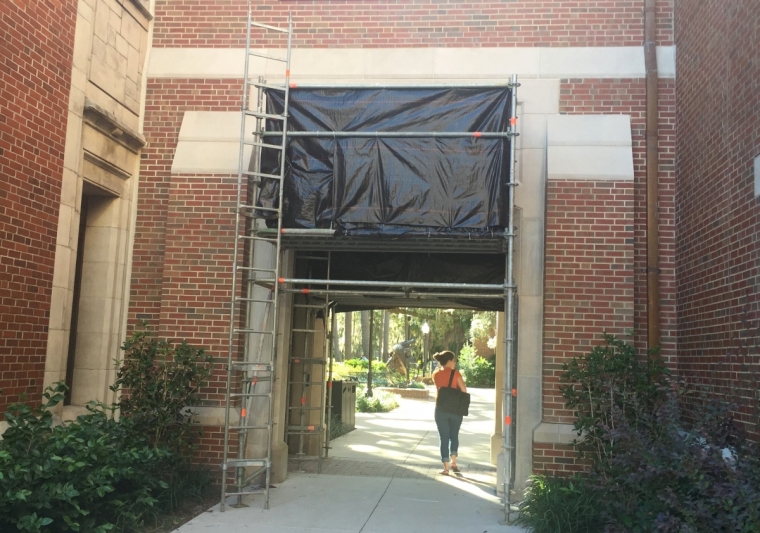University compromises with atheist group over biblical inscription

GAINESVILLE (Christian Examiner) – The University of Florida has reached a compromise with the Freedom from Religion Foundation over the presence of a biblical inscription on a campus building.
In April, the Wisconsin-based atheist group filed a complaint with the university over the presence of Micah 6:8 over an archway leading to the courtyard of the newly-constructed Heavener School of Business.
Micah 6:8 reads, "He has shown you, O man, what is good. And what does the Lord require of you? To act justly and to love mercy and to walk humbly with your God."
The building was funded largely through the gifts of James W. Heavener, a Christian businessman who is CEO of Full Sail University, a University of Florida trustee and a board member of the Tim Tebow Foundation.
The complaint filed in April by FFRF claimed "the inscription violates the Establishment Clause of the First Amendment and cannot remain on university property. ... The fact that the building was funded by donations does not solve the constitutional violation."
Scholars and students of ethics derive universal ethical principles from a wide range of sources, secular and religious, whether or not any particular scholar or student ascribes to religious beliefs. ... the School is seeking only to encourage students to identify and explore the core universal ethical principles of justice, mercy and humility, being a citizen of the world, seeking to do good, and unselfishly serving the greater good.
"The inscription demonstrates a school preference for religion over nonreligion and for Christianity over all other faiths. When a school chooses to display an excerpt from a religious text, it signals students who hold differing beliefs that they are outsiders, that they are excluded from the campus community," the complaint said.
Several student groups on campus, including Gator Free Thought and Humanists on Campus, also complained about the inscription.
Now, however, all sides in the fight seem to have found a via media – a middle way – that allows the biblical inscription to remain when accompanied by other ethical quotes from non-religionists and philosophers.
A statement from the Florida school Oct. 12 said the school had designed an "ethical portal" to highlight the importance of ethics in business.
"One of the quotes was provided by the building's donor and the school's namesake, James W. Heavener, and is already installed. Its core universal ethical principles of justice, mercy and humility are from a religious source," the statement said.
"Three of the quotes are from secular sources. Of these, two were contributed by a faculty member who teaches ethics. A third relates to the School's commitment to global, ethical business, was suggested by the Freedom from Religion Foundation, and was approved by the ethics faculty member and dean."
The quotes chosen to accompany Micah 6:8 include the following:
- "To restrain our selfish[ness], and to indulge our benevolent affections, constitutes the perfection of human nature." Adam Smith, The Theory of Moral Sentiments, 1759
- "Wealth is evidently not the good we are seeking; for it is merely useful and for the sake of something else." Aristotle, Nicomachean Ethics
- "My country is the world, and my religion is to do good." Thomas Paine, The Rights of Man, 1791
A new plague will also explain the presence of the quotes. It claims that "ethics are fundamental to successful business education and enterprise."
"Scholars and students of ethics derive universal ethical principles from a wide range of sources, secular and religious, whether or not any particular scholar or student ascribes to religious beliefs. Three of the quotes on the four surfaces of this Ethical Portal are secular sources of universal ethical principles relevant to business, and one is a religious source. While the quote from a religious source has broader personal meaning to James W. Heavener, who provided the quote and after whom Heavener Hall and the Heavener School of Business are named—and while Thomas Paine did not ascribe to a personal deity and his quote derives from his belief in a natural order and the 'exercise of reason' – the School is seeking only to encourage students to identify and explore the core universal ethical principles of justice, mercy and humility, being a citizen of the world, seeking to do good, and unselfishly serving the greater good," the plaque reads.
The university's statement also included a claim that it has "no interest in advancing or burdening religion." It also said the installation of the plaque and the new inscriptions will be completed within a few weeks.
True to form, FFRF issued one last insult to those who hold religious beliefs in its response to the decision. While it said the compromise was "acceptable" and the university's response was "thoughtful," FFRF Co-President Annie Laurie Gaylor added:
"We're glad to note that two of the four quotes are by freethinkers. Many people do not realize that Adam Smith was a freethinker in his own right, saying in The Wealth of Nations: 'Science is the great antidote to the poison of enthusiasm and superstition.'"